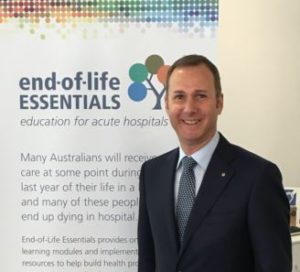
Support materials for delivering more informed end-of-life health care in acute hospitals has been prepared by palliative care experts at Flinders University.
Fifty-two percent of Australians die in an acute hospital and many will receive care in hospitals at some point during the last year of their lives.
Care that recognises and meets their individual needs and supports their family is crucial, says Kim Devery, Head of Discipline, Palliative and Supportive Services at Flinders.
“We need to ensure that doctors, nurses and allied health staff have the skills to deliver this important area of patient care,” she says.
“End-of-life care is complex. No matter where they work or how many years’ experience they have, health professionals often find end-of-life care challenging.”
Three online education modules, called the End-of-Life Essentials package, were launched last month to support them in delivering end-of-life care.
All components of the free e-learning package draw upon the Australian Commission on Safety and Quality in Health Care (ACSQHC) National Consensus Statement: Essential elements for safe and high-quality end-of-life care.
ACSQHC chairman Professor Villis Marshall joined other health-care leaders at the launch at the Flinders Centre of Innovation in Cancer on 24 June.
Also last month, CareSearch the Federal Government-funded project palliative care group at Flinders, launched Dying2Learn, a free Massive Open Online Course (MOOC) to get more people talking about death and dying with Australia’s first to broach the social aspects of the topic.
The course aims to stimulate social conversations among Australians and build greater community awareness about death, dying, and palliative care and get Australians thinking about what choices they might have that could affect how they die.
Some of the topics in the five-week online course – running from June 27 to July 31 – will include:
- Thinking about the language we use when talking about dying
- Understanding changing approaches to funerals and memorialisation of the dead
- Learning about how and what people die from
- Discussing the implications of the “medicalisation” of death and dying
- Finding out how art, music, and media have shaped our ideas on death
- Discovering what happens in the digital world when people die
It has been estimated that 9 out of 10 people never discuss their end-of-life wishes, 45 per cent of people die without having a will and, while 80 per cent express a wish to die at home, only 20 per cent actually do so.
“If people start to feel more comfortable with thinking and talking about death and dying, then there is a greater likelihood that they will make their end-of-life wishes known, and they might be more likely to have those wishes respected and followed,” says Dr Christine Sanderson, a palliative care specialist and Flinders University researcher.
“We hope that participants in the MOOC will be stimulated to reflect on their own attitudes and those of other Australians, and might even consider how they will approach the 100 per cent normal experience of dying when their turn arrives.”
Developed by a team led by Associate Professor Jennifer Tieman, the MOOC team is also collaborating with the Groundswell Project to promote the National Dying to Know Day on August 8.

